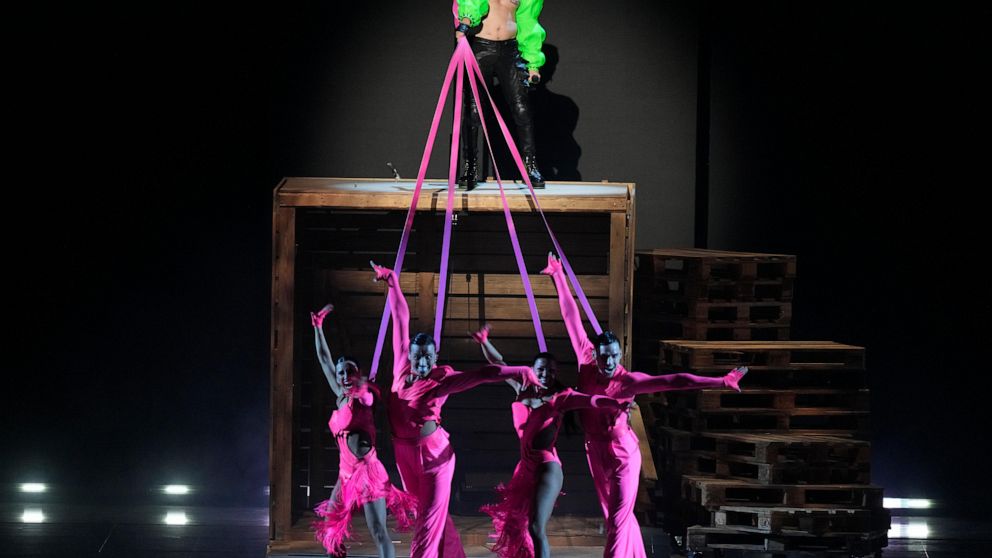LIVERPOOL, England — Liverpool cleaned up from the Eurovision Song Contest on Sunday, as Sweden celebrated victory and Ukraine remained defiant after a night of Russian bombardment, including a strike on the hometown of the country’s competitors.
Electronic duo Tvorchi represented Ukraine at the spectacular pan-continental pop competition on Saturday night, coming sixth of the 26 finalists with “Heart of Steel,” an anthem to the country’s resilience inspired by the siege of the Azovstal steelworks in Mariupol.
Air raid sirens sounded across Ukraine as the contest was underway in Liverpool, and Ukraine’s military said a barrage of Russian drones and missile strikes left dozens wounded. One strike hit Ternopil, home city of Tvorchi in western Ukraine.
Ternopil was attacked again on Sunday morning, Ukraine’s State Emergency Service said. Civilian buildings and cars were damaged; there was no immediate information on victims.
“Ternopil is the name of our hometown, which was bombed by Russia while we sang on the Eurovision stage about our steel hearts, indomitability and will,” the duo of Andrii Hutsuliak and Jeffery Kenny posted on Instagram late Saturday.
“This is a message for all cities of Ukraine that are shelled every day. Kharkiv, Dnipro, Khmelnytskyi, Kyiv, Zaporizhzhia, Uman, Sumy, Poltava, Vinnytsia, Odesa, Mykolaiv, Chernihiv, Kherson and all others. Europe, unite against evil for the sake of peace! GLORY TO UKRAINE!”
Russia, a longtime Eurovision participant, was kicked out last year over its invasion of Ukraine.
Swedish singer Loreen won the contest with her power ballad “Tattoo,” at a colorful, eclectic music competition clouded for a second year by the war in Europe. Britain hosted Eurovision on behalf of Ukraine, which won last year but couldn’t take up its right to hold the event because of the war.
The sights and sounds of Ukraine ran through the show, starting with an opening film that showed 2022 Eurovision winners Kalush Orchestra singing and dancing in the Kyiv subway, with the tune picked up by musicians in the U.K. — including Kate, Princess of Wales, shown playing the piano.
Kalush Orchestra said Sunday that the participation of Kate, who is married to Britain’s Prince William, “shows the depth of support the U.K. has for Ukraine and helps us highlight to the world what our country is going through.”
“It also shows impressive piano skills and we would definitely like to invite her to tour with us if she would like to pursue a new career in (a) hip hop folk band?!” Kalush Orchestra said.
The folk-rap band kicked off Saturday’s show in person, emerging onstage in the Liverpool Arena on a giant pair of outstretched hands, accompanied by massed drummers. It was one of several Ukrainian acts to perform during the almost four-hour show.
Now in its 67th year, Eurovision bills itself as the world’s biggest music contest — an Olympiad of party-friendly pop. Competitors each have three minutes to meld catchy tunes and eye-popping spectacle into performances capable of winning the hearts of millions of viewers.
Loreen’s anthem of intense love had been the bookies’ favorite. She faced a strong challenge from Finnish singer Käärijä, a wildly energetic performer whose rap-pop party anthem “Cha Cha Cha” came second.
Loreen, 39. who previously won Eurovision in 2012, said becoming only the second person to take the crown twice left her “seriously overwhelmed.” Ireland’s Johnny Logan was the first double winner, in the 1980s. Sweden’s victory is the country’s seventh, matching Ireland’s record.
The win gives Sweden the right to host next year, the 50th anniversary of Sweden’s first Eurovision triumph — ABBA’s 1974 victory with “Waterloo.”
The contest came down to a nail-biting finish between Loreen, who won the jury vote of music professionals across Europe, and Käärijä, who was the runaway winner in voting by the viewing public.
The Finn acknowledged that he was disappointed.
“Of course, to be honest, it feels bad. What I was looking for was a win,” Käärijä told Finnish media outlets in Liverpool. “You of course have to be proud of this performance. A cool performance with a Finnish song. I’ve got a slightly sad feeling. But life goes on. It’s not that serious. You’ve got to move on with life.”
Käärijä was the undoubted star of Eurovision, and the insistent chorus of “Cha Cha Cha” is likely to be heard on dancefloors across Europe this summer.
Mae Muller, representing host country Britain, came second-last — a far cry from 2022, when the U.K.’s Sam Ryder finished second behind Ukraine.
Liverpool, which won a competition among U.K. cities to host the event, embraced both Eurovision and Ukraine with open arms and hearts. Businesses across the city flew Ukrainian flags and a program of cultural events introduced locals to the art, music and food of the eastern European country.
Police said half a million people joined in nine days of celebrations, with only three arrests.
However, organizers said they turned down a request by Ukrainian President Volodymyr Zelenskyy to make a video address. The European Broadcasting Union said that would breach “the nonpolitical nature of the event.”
Despite organizers’ professed attempts to avoid politics, several of this year’s entries had a strong antiwar message, including “Watergun” by Switzerland’s Remo Forrer and “Mama ŠČ!” by Croatia’s Let 3, a surreal sendup of military dictators.
Source : ABC News


